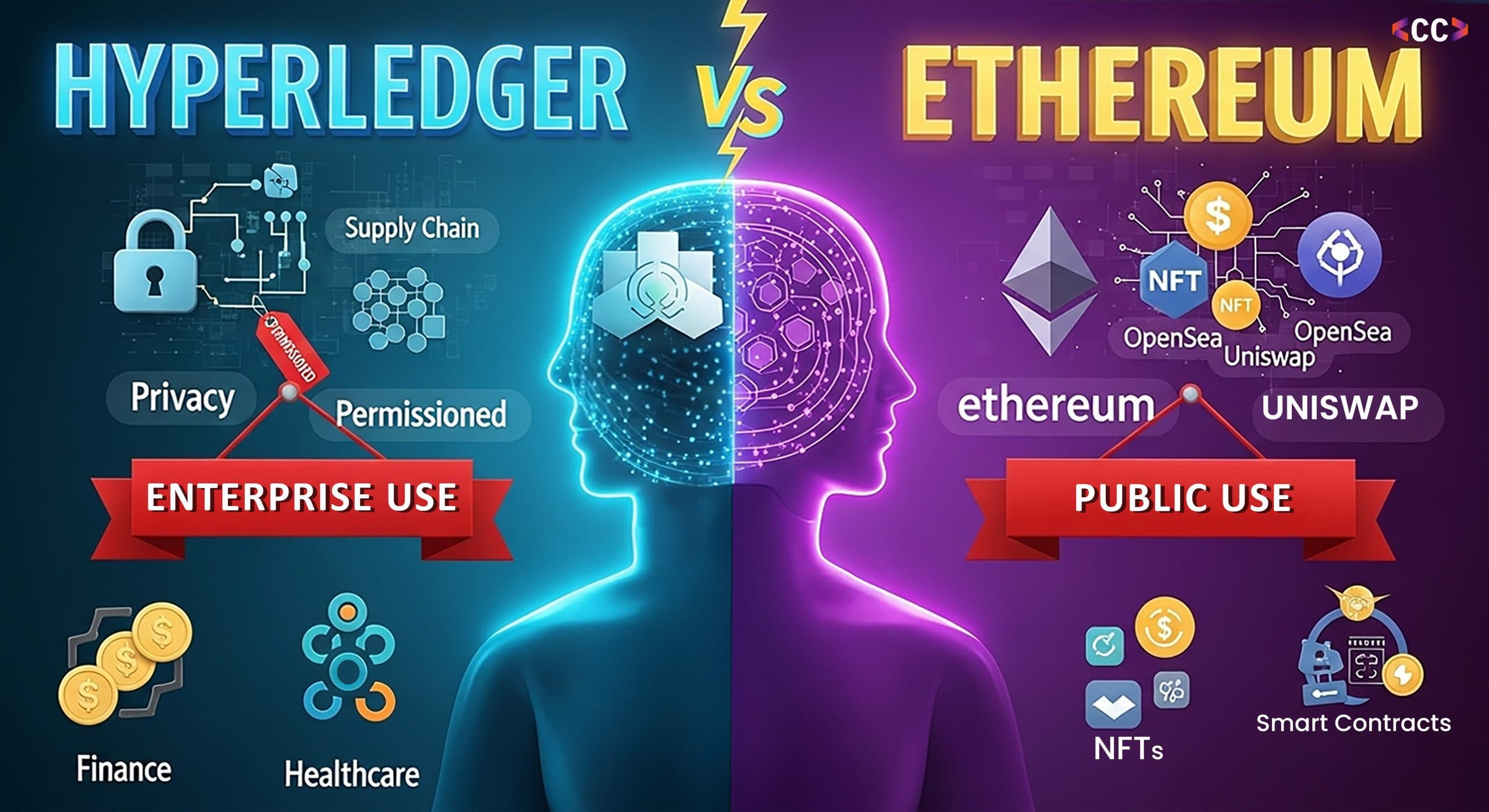Blockchain
6 months ago
Hyperledger Fabric vs Ethereum: Which One Should Enterprises Choose?
In the rapidly evolving world of blockchain technology, enterprises face a key decision: which blockchain platform best aligns with their business needs? Two of the most prominent contenders are Hyperledger Fabric and Ethereum—each offering distinct features, benefits, and limitations.
In this blog, we explore the differences, use cases, and decision-making factors enterprises should consider when choosing between Hyperledger Fabric and Ethereum.
What Is Hyperledger Fabric?
Hyperledger Fabric, hosted by The Linux Foundation, is an open-source, permissioned blockchain platform designed specifically for enterprise-grade applications. It allows businesses to create modular, private blockchain networks where data visibility is tightly controlled.
Key Features:
- Permissioned Access: Only authorized participants can join the network.
- Modular Architecture: Pluggable consensus and membership services.
- High Throughput & Low Latency: Optimized for business transactions.
- Private Channels: Allows secure, private data sharing between selected parties.
What Is Ethereum?
Ethereum is a public, permissionless blockchain that supports smart contracts and decentralized applications (dApps). With the launch of Ethereum 2.0, it has improved scalability and energy efficiency.
Key Features:
- Smart Contracts: Self-executing code for trustless transactions.
- Public Network: Fully decentralized, anyone can participate.
- Large Developer Community: Thousands of dApps and tools.
- Interoperability: Broad ecosystem across DeFi, NFTs, and DAOs.
Hyperledger vs Ethereum: Key Differences
| Feature | Hyperledger Fabric | Ethereum |
| Network Type | Permissioned (Private) | Permissionless (Public) |
| Consensus Mechanism | Pluggable (Raft, Kafka, etc.) | Proof of Stake (Ethereum 2.0) |
| Smart Contracts | Chaincode (in Go, Java, etc.) | Solidity-based |
| Privacy | Private channels and data segregation | All data is public |
| Speed & Scalability | High (Designed for enterprise) | Moderate (depends on gas fees and network load) |
| Use Cases | Supply chain, finance, healthcare | DeFi, NFTs, DAOs, dApps |
| Governance | Enterprise-controlled | Community-driven |
Best Use Cases for Enterprises
When to Choose Hyperledger Fabric
- You need data privacy and access control
- You operate in regulated industries (finance, healthcare, logistics)
- You want a private consortium network
- Your use case involves high-volume, low-latency transactions
When to Choose Ethereum
- You’re building public-facing applications
- Your product involves tokens, NFTs, or DeFi
- You need broad user engagement and community validation
- Interoperability with other Web3 apps is important
Real-World Examples
- Hyperledger Fabric:
- Walmart uses Fabric for supply chain traceability.
- ChainCode’s NFTtrace leverages permissioned blockchain for secure RWA traceability.
- Ethereum:
- Uniswap, OpenSea, and Aave run on Ethereum.
- Public NFT mints and DeFi apps dominate this space.
Which Blockchain Platform Should Enterprises Choose?
There’s no one-size-fits-all answer. Enterprises must consider:
- Privacy Requirements – Does your data need to be private or public?
- Regulatory Compliance – Are you operating in a regulated industry?
- Transaction Speed & Scalability – Do you require real-time processing?
- Ecosystem Needs – Do you need a broad user base or internal collaboration?
ChainCode Can Help You Decide
At ChainCode Consulting, we specialize in helping businesses choose, design, and implement the right enterprise blockchain platform—be it Hyperledger Fabric, Ethereum, or a hybrid approach.
Our deep expertise in permissioned blockchain development, smart contracts, and secure deployments ensures your solution is tailored for maximum ROI, compliance, and scalability.
Get a Free Blockchain Consultation →
Conclusion
When it comes to Hyperledger vs Ethereum, the decision depends on your specific enterprise goals. If privacy, control, and scalability are your priorities, Hyperledger Fabric is likely the better fit. If you’re building for the open Web3 ecosystem, Ethereum is the way forward.
Choose wisely—and let ChainCode Consulting help you lead with blockchain innovation.
blockchain

